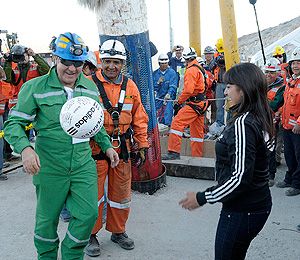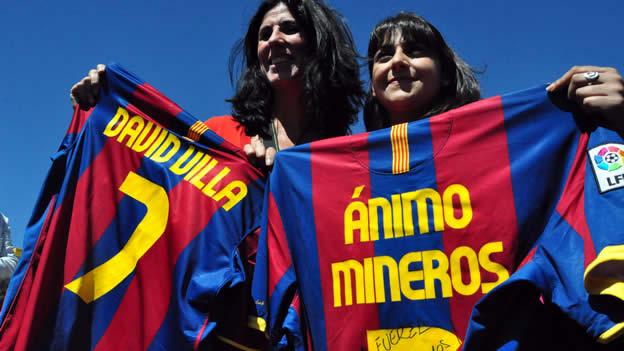Could the 27th man freed from the Chilean mine disaster be about to rescue the reputation of football?
As Franklin Lobos emerged from the depths of the San Jose mine and stepped into the sun of the Atacama Desert, football was unlikely to be the first thing on his mind. But after 69 grueling days 700m underground, the 53-year-old former international midfielder was instantly reunited with the game that has made him a hero in Copiapo.
Daughter Carolina presented him with a football signed by friends and family and Lobos wasted no time in showcasing his skills to a jubilant crowd. Even though he only managed a couple of kick-ups before dropping the ball and hugging Carolina, Lobos was clearly delighted at cheating death in what locals call the Kamikaze Mine.

The dangers of the San Jose mine are well documented. Just one month before the collapse on August 5, miner Gino Cortes lost a leg in an accident, while another miner tragically died a few years earlier. So what was an ex-professional footballer doing working in an unstable mine?
Despite a healthy fifteen-year career, Lobos’ wages as a footballer were very modest. A former team mate insisted he never had any interest in money or designer labels and cared only that his family were well, and since retiring in 1995 he has continued to work to provide for them. But having worked as a car mechanic and a cab driver, Lobos took a job transporting the San Jose miners because he needed to earn more money.
However, Franklin Lobos is no ordinary ex-professional turned miner. He is an idol. Dubbed El Mortero Magico (the Magic Mortar) for his thunderous free-kicks, Lobos wrote himself into the Regional Atacama history books by scoring the first goal in the club’s history. And when he led them to promotion to the first division of Chilean soccer in 1981, Lobos delivered the greatest moment in the club’s history. In fact, Lobos and his 1981 team mates were so adored by the fans, that when the city opened a new stadium it was they and not the current professionals who were invited to play the very first game.
Lobos also represented Chile in their qualifying matches for the 1984 Olympics in Los Angeles and played for Deportes La Serena, Santiago Wanderers, Deportes Iquique and Cobresal before retiring. And it was during his spell at Cobresal that he left a lasting impression on future Chile legend Ivan Zamorano.
“Back then he was the star of the team and I only played every so often”said Zamorano. “I remember he used to strike free-kicks with his ankle, which put a special spin on the ball that I’ve never seen a player repeat since.”
But it wasn’t just Lobos’ technical abilities and venomous set pieces that struck Zamorano, it was his influence on his Cobresal team mates.
“I reckon that when he was trapped down the mine he would have gone back to the way he was in his playing days”he added. “He’s a very fiery man, who used to drag his team-mates up by their bootstraps. I’m sure he was key to helping them stay alive down there.”
Lobos’ plight alongside his colleagues impacted football across the world and when first contact with the trapped miners was made after 17 punishing days, Barcelona striker David Villa was quick to pledge his support. Villa, himself from a mining family in the Spanish region of Asturias, sent two Barcelona shirts saying, ”Miners, keep your spirits up.”
However, during his time nearly half a mile beneath the ground, Lobos was also trying to lift the spirits of others and found strength to pen a letter to Deportes Copiapo – the team that replaced his beloved Atacama as Copiapo’s local team when they ceased to exist in 1999. Lobos urged Copiapo to “be as persistent as the miners” as they stood on the brink of relegation and selflessly seemed more concerned with their plight than his own.
So can this thoughtful, loving miner rescue the image of modern day football from its own pit of darkness?
In an age where multi-millionaire players drag football through the mud with their booze-fuelled antics, drug taking, infidelities and smashed supercars, here is a former player prepared to lay down his life in return for $1,500 a month to put his daughters’ through college.
At the same time Wayne Rooney wants to leave Manchester United because they won’t match his £200,000 a week wage demands, here is a man who having been cut off from civilisation for 17 days, wanted nothing more than to wish what remains of his old club good luck in their relegation battle.
The contrast could not be greater.
Lobos is now set to captain a side made up of the freed miners in a game against officials who rescued them – including first rescuer into the mine, safety expert and former professional footballer Manuel Gonzalez, who incredibly played against Lobos 25 years ago and had not seen him since until the rescue.
The game will complete a remarkable return to the people of Copiapo for Lobos and the Chilean Football Federation are rumoured to be offering him a job with their youth teams. Here’s to hoping the story of El Mortero Magico can fire some humility into the players of today and not just Chile’s stars of tomorrow.
Add Sportslens to your Google News Feed!
